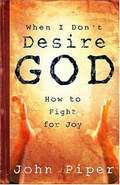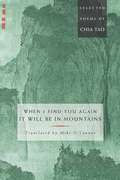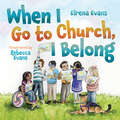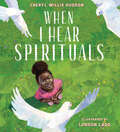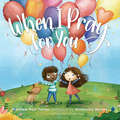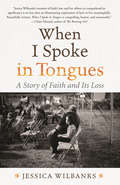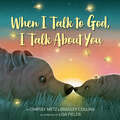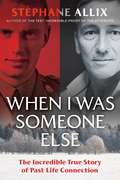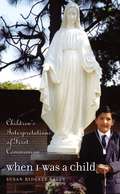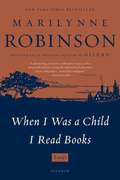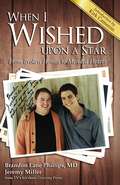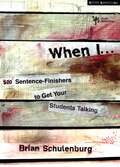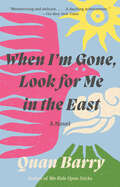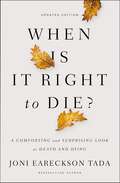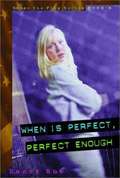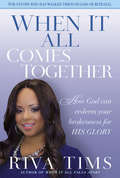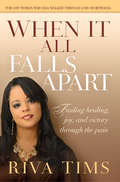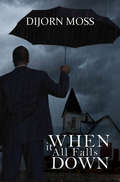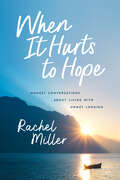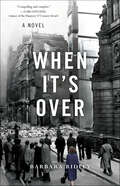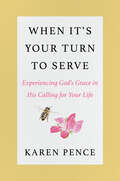- Table View
- List View
When Hope Springs New (Canadian West, Book #4)
by Janette OkeLeaving behind their dear friends in Beaver Creek, Elizabeth and Wynn take over an even more primitive outpost in the Canadian Northwest.
When I Don't Desire God: How to Fight for Joy
by John PiperJoy is more than an afterthought of the Christian life; it is the sustaining fruit of a relationship with God. With radical passion for God's glory, John Piper helps you find the joy God wants you to have.
When I Find You Again, It Will Be in Mountains: The Selected Poems of Chia Tao
by Mike O'ConnorChia Tao (779-843), an erstwhile Zen monk who became a poet during China's Tang dynasty, recorded the lives of the sages, masters, immortals, and hermits who helped establish the great spiritual tradition of Zen Buddhism in China. Presented in both the original Chinese and Mike O'Connor's beautifully crafted English translation, When I Find You Again, It Will Be in Mountains brings to life this preeminent poet and his glorious religious tradition, offering the fullest translation of Chia Tao's poems to date.
When I Go to Church, I Belong: Finding My Place in God's Family as a Child with Special Needs
by Elrena EvansChildren with disabilities often struggle to fit in, but church can be a place where everyone is welcome and included! When I Go to Church, I Belong follows the story of six children, helping us better understand the experiences and feelings of those with special needs. And it reminds us that even though we have our differences, we also have so much in common. Written by Elrena Evans and illustrated by Rebecca Evans, this message of inclusion and belonging can be enjoyed by children and the adults who read with them. Also included is a note from the author to encourage further conversation about the content. Discover IVP Kids and share with children the things that matter to God!
When I Hear Spirituals
by Cheryl Willis HudsonYour spirit will soar! A girl connects with heritage, history, and a higher power through the lyrics of twelve beloved spirituals and four seminal events in African American history. A beautiful keepsake to be shared by multiple generations.When I hear spirituals Sometimes A big, full feelingGrows in my chest . . . Her heart pounds, she gets a lump in her throat, and tears flow down her cheeks. She wants to clap her hands and stomp her feet. There is healing, tenderness, strength, pride, and above all, hope.The author of the classic picture book Bright Eyes, Brown Skin, Cheryl Willis Hudson, has woven together lyrics of twelve timeless, Black spirituals with a moving exploration of how music holds memories, emotions, and empowerment.Songs include &“Go down, Moses,&” &“Nobody Knows the Troubles I See,&” &“Sometimes I Feel Like a Motherless Child,&” &“Rock-a-My Soul,&” &“Get on Board, Little Children,&” and more. Evocative illustrations by award-winning artist London Ladd depict important people and places in Black history and culture: Harriet Tubman, Martin Luther King, Jr., the Great Migration, and the Enslaved People&’s Uprising of 1811. Journey through Black history and music in this layered picture book.A Junior Library Guild Gold Standard Selection
When I Pray for You
by Matthew Paul TurnerFrom the author and illustrator of the best-selling When God Made You comes a new illuminating message about God's design affirming young readers.With lyricism, whimsy, and heartfelt emotion, Matthew Paul Turner reveals the tender emotions connected with watching a beloved child grow up and experience the world. Paired with Kimberley Barnes's vivid and playful illustrations, When I Pray for You is a beautifully affirming book, in which children and parents will see their own stories come to life. When I Pray for You celebrates the dreams, hopes, and longings parents pray over their children, and shares with the little ones how much care and concern a loved one feels for them. This is a book you will read to your child again and again. Perfect for any occasion, as well as for milestones including baby showers, birthdays, and graduations. From the moment I saw you, I started to pray.Big prayers and small ones I have sent God's way.I prayed you felt safe,full of joy and content.When I whispered "I love you,"you knew what I meant.
When I Spoke in Tongues: A Story of Faith and Its Loss
by Jessica WilbanksA memoir of the profound destabilization that comes from losing one's faith--and a young woman's journey to reconcile her lack of belief with her love for her deeply religious family.Growing up in poverty in the rural backwoods of southern Maryland, the Pentecostal church was at the core of Jessica Wilbanks' family life. At sixteen, driven by a desire to discover the world, Jessica walked away from the church--trading her faith for freedom, and driving a wedge between her and her deeply religious family. But fundamentalist faiths haunt their adherents long after belief fades--former believers frequently live in limbo, straddling two world views and trying to reconcile their past and present. Ten years later, struggling with guilt and shame, Jessica began a quest to recover her faith. It led her to West Africa, where she explored the Yorùbá roots of the Pentecostal faith, and was once again swept up by the promises and power of the church. After a terrifying car crash, she finally began the difficult work of forgiving herself for leaving the church and her family and finding her own path.When I Spoke in Tongues is a story of the painful and complicated process of losing one's faith and moving across class divides. And in the end, it's a story of how a family splintered by dogmatic faith can eventually be knit together again through love.
When I Talk to God, I Talk About You
by Chrissy Metz Lisa Fields Bradley CollinsFrom Chrissy Metz, star of the hit NBC television show This Is Us, and Bradley Collins comes a gorgeous, heartwarming picture book of faith, prayer, and the loving bond between parent and child. <p><p>When I talk to God, guess what I do?It's really quite simple: I talk about you. From bears and otters to rabbits and raccoons, these animals describe the many things they pray to God for as their little ones grow right before their eyes. <p><p>With stunning illustrations from Lisa Fields, this is a touching ode to unconditional love and the perfect book to help introduce little ones to prayer. Perfect for fans of Matthew Paul Turner's When God Made You, Rachel Held Evans's What Is God Like?, Lisa Tawn Bergren and Laura J. Bryant's God Gave Us You, Ainsley Earhardt's I'm So Glad You Were Born, and Joanna Gaines's The World Needs Who You Were Made to Be. <p> <b>New York Times Bestseller</b>
When I Was Someone Else: The Incredible True Story of Past Life Connection
by Stéphane AllixA journalist&’s profound investigation into the reality behind an intense waking vision and the search for healing after death • Details the author&’s vivid waking vision of a dying German soldier in World War II and how he discovered the soldier was a real person, including his research into German military archives and meeting the man&’s surviving family members • Explores synchronicities, reincarnation, and communication across the veil between life and death • Reveals how the author helped the dead soldier find forgiveness and healing While on a spiritual retreat in Peru, journalist Stéphane Allix experienced a vivid waking vision of a soldier dying on a snowy battlefield, followed by scenes from the soldier&’s earlier life. He also clearly saw the man&’s name, Alexander Herrmann, and felt a disturbing sense of closeness with the soldier. Obsessed by the power of this extremely real vision, Allix began an intensive investigation that revealed this individual had actually existed: a German soldier who died in World War II during the 1941 Russian campaign. As he began retracing Herrmann&’s past, he found that the other images accompanying the battle scene were also of people who had truly existed and were close to the man who died. Diving deep into German military archives, meeting the man&’s surviving family members, and following his own intuitive hunches, the author also discovered that the soldier was part of the Waffen S.S., the infamous Totenkopf Brigade, and his investigation broadened to explore what drove Herrmann to become part of such an organization. While Allix&’s initial impression is that this German soldier was a past life, as he progresses in his rigorous investigation and his decoding of the events surrounding it, he realizes that it was actually his own work with the paranormal and his unresolved feelings over the death of his brother and his father that made him particularly sensitive to the veil between life and death, culminating in the soul of this dead soldier coming to him in search of forgiveness and healing. Allix realizes that his mission is not to bring about the rebirth of this person but to heal him--and the victims of his ignominious actions during the war. Offering a fascinating exploration of visions, synchronicities, reincarnation, and the connections between the spiritual and physical planes, When I Was Someone Else shares a powerful message of healing after death along with the profound epiphany that light needs darkness to be perceived.
When I Was a Child
by Susan RidgelyFirst Communion is generally understood as a rite of passage in which seven- and eight-year-old Catholic children transform from baptized participants in the Church to members of the body of Christ, the universal Catholic Church. This official Church account, however, ignores what the rite actually may mean to its participants. In When I Was a Child, Susan Ridgely Bales demonstrates that the accepted understanding of a religious ritual can shift dramatically when one considers the often neglected perspective of child participants. Bales followed Faith Formation classes and interviewed communicants, parents, and priests in an African American parish and in a parish containing both white and Latino congregations. By letting the children speak for themselves through their words, drawings, and actions, When I Was a Child stresses the importance of rehearsal, the centrality of sensory experiences, and the impact of expectations in the communicants' interpretations of the Eucharist. In the first sustained ethnographic study of how children interpret and help shape their own faith, Bales finds that children's perspectives give new contours to the traditional understanding of a common religious ritual. Ultimately, she argues that scholars of religion should consider age as distinct a factor as race, class, and gender in their analyses.
When I Was a Child I Read Books
by Marilynne RobinsonWhen I Was a Child I Read Books' tackles the charged political and social climate in this country, the deeply embedded role of generosity in Christian faith, and the nature of individualism and the myth of the American West.
When I Wished upon a Star: From Broken Homes to Mended Hearts
by Brandon Lane Phillips Jeremy James MillerGrowing up as a patient with congenital heart disease, Brandon Lane Phillips often felt alone. He knew no one else who had his heart condition and believed no one understood his condition. Brandon believed he would die young. Like many congenital heart patients, he wondered if he would have a long life. It is only natural to question one’s mortality when open-heart surgery is what enabled you to survive childhood.Brandon worried that his heart defect caused his parents’ divorce and questioned just how much his illness had affected his siblings since so much extra attention was devoted to him. He longed to have the type of close relationship with his father that he saw on many of his favorite TV shows.At 11 years of age, he was so desperate to find answers that he asked God to show him that He loved him. Soon after, he received a wish to meet child actor Jeremy Miller from TV’s Growing Pains. Brandon had wished to meet him because he envied his “perfect” fictional family. After one of the show’s stars told Brandon that God had a plan for his life, Brandon left the set that evening feeling that the trip had been orchestrated as an answer to his prayer.There are several God-like coincidences that occur along Brandon’s path of becoming a pediatric cardiologist. Many times when Brandon would face a life experience big enough to shake his faith, an improbable experience would occur that would remind him of his wish and God’s answer to his prayer. Throughout his career, he would encounter other patients who felt alone and had questions about their own mortality.Brandon chose medicine as his profession because he greatly admired his childhood pediatric cardiologist. And even though a need for a second open-heart surgery at the beginning of medical school threatened Brandon’s dream of becoming a physician, he would ultimately be trained by the very physicians who had cared for him.Brandon’s journey of hope found within the pages of When I Wished Upon a Star is a story of giving back and finding purpose in life through the intervention of God’s great grace and perfect timing.The other life examined in this book belongs to Jeremy Miller, child actor, celebrity wish, and the friend who played an important role in Brandon’s journey. Brandon’s life truly changed forever after having met Jeremy on the television set of Growing Pains.While Brandon was dealing with his struggles, so too was Jeremy. In When I Wished Upon a Star, Jeremy shares “secrets” from his childhood that have previously gone untold. It would be easy to say that Jeremy was a child star, and that historically, most child stars aren’t expected to have a good end. Still Jeremy’s secrets shocked Brandon and brought him to tears. They also shed light on the reason for Jeremy’s battle with alcohol. Brandon would learn that Jeremy, too, envied the life that his fictional character lived. And so when the TV show ended, Jeremy almost did too.At the time of his wish, only God could have predicted how Brandon’s life and those of the stars of his favorite TV show would intertwine in the decades to follow; no one could have foreseen that a wish made by a young boy would give both he and Jeremy hope for their future and help them find purpose in the lives they were created for by a loving God--lives that would live on despite troubles and despair.Brandon was meant to use the experiences of his childhood to help others. It is the only way to explain how his life has come full circle time and time again.
When I …: 500 Sentence-Finishers to Get Your Students Talking (Quick Questions)
by Brian SchulenburgSometimes you just need the right question to get your students talking. (And then sometimes you can’t get them to stop talking!) The latest in the best-selling Quick Questions series, When I… gives you 500 finish-the-sentence statements that will get students talking. With everything from silly to serious, you’ll get your students finishing sentences like: • When I was a baby… • When I have to confront somebody… • When I see my parents kiss… • When I see a homeless person… • When I confess my sin… Perfect for ice-breakers, road trips, small group discussions, or just about any other ministry setting, this is a useful resource for anyone in youth ministry, whether paid or volunteer, rookie or veteran. When I… will open up opportunities for discussions and conversations that will draw students and leaders closer together and will lead to new insights into what’s happening in the hearts and minds of students.
When I'm Gone, Look for Me in the East: A Novel
by Quan BarryFrom the acclaimed author of We Ride Upon Sticks comes a luminous novel that moves across a windswept Mongolia, as estranged twin brothers make a journey of duty, conflict, and renewed understanding.Tasked with finding the reincarnation of a great lama—a spiritual teacher who may have been born anywhere in the vast Mongolian landscape—the young monk Chuluun sets out with his identical twin, Mun, who has rejected the monastic life they once shared. Their relationship will be tested on this journey through their homeland as each possesses the ability to hear the other&’s thoughts.Proving once again that she is a writer of immense range and imagination, Quan Barry carries us across a terrain as unforgiving as it is beautiful and culturally varied, from the western Altai mountains to the eerie starkness of the Gobi Desert to the ancient capital of Chinggis Khaan. As their country stretches before them, questions of faith—along with more earthly matters of love and brotherhood—haunt the twins.Are our lives our own, or do we belong to something larger? When I&’m Gone, Look for Me in the East is a stunningly far-flung examination of our individual struggle to retain our convictions and discover meaning in a fast-changing world, as well as a meditation on accepting what simply is.
When Is It Right To Die?
by Joni Eareckson TadaTada offers a counterbalance to the "quick fix" advice of ending suffering through euthanasia and suicide with hope, compassion and real "death with dignity."
When Is It Right to Die?: A Comforting and Surprising Look at Death and Dying
by Joni Eareckson TadaMore and more people who are terminally ill are choosing assisted suicide. When is it Right to Die? offers a different path with alternatives of hope, compassion, and death with real dignity. Joni Eareckson Tada knows what it means to wrestle with this issue and to wish for a painless solution. For the last 50 years she has been confined to a wheelchair and struggled against her own paralysis. And she sat by the bedside of her dying father, thinking, So much suffering, why not end it all quickly, painlessly? The terminally ill, the elderly, the disabled, the depressed and suicidal, can all be swept up into this movement of self-deliverance. Skip the suffering. Put a quick end to merciless pain and mental anguish. These are tempting enticements to the hurting. Joni doesn’t give pat answers. Instead, she gives warm comfort from God and practical help to meet the realities for those facing death. When Is It Right to Die tells the stories of families who have wrestled with end-of-life questions and found that death with dignity does not necessarily mean three grams of Phenobarbital in the veins. Behind every right-to-die situation is a family. A family like yours. In her warm, personal way, Joni takes the reader into the lives of families and lets them speak about assisted suicide. What they say is surprising.Whether you have a dying family member, facing moral and medical choices, or struggling with a chronic condition that feels overwhelming, this book will help you find practical encouragement and biblical advice to help you make difficult decisions.This book is revised and updated to examine the current events, trending issues, and the rising acceptance of assisted suicide in this country.
When Is Perfect, Perfect Enough? (Raise the Flag #6)
by Nancy RueShannon suffers in the shadow of her wild and uncontrollable younger sister Caitlin, who seems ready to tear their Christian family apart, and finds herself developing an eating disorder.
When It All Comes Together: How God Can Redeem Your Brokenness for His Glory
by Riva TimsBe encouraged to find hope in the midst of crisis by understanding how God uses our difficulties for our good. Riva Tims and her late ex-husband, Zachery Tims, were the pastors of a megachurch in Central Florida until news of his infidelity surfaced. After the couple&’s public divorce, Zachery lost his battle with drug addiction. Riva has overcome the betrayal, heartbreak, grief, and loss while holding on to her faith in God. In a moving sequel to the story she shared in When It All Falls Apart, Tims&’s powerful new book helps you learn to positively identify defining moments in your life—which often surface during difficult circumstances—and see how God is meticulously at work through all you experience. Tims&’s life exemplifies the truth that God gives a double anointing to those who stand in faith through tribulation.
When It All Falls Apart: Find Healing, Joy and Victory through the Pain
by Riva Tims&“I began to question whether I would live through the pain.&” It felt like her world had ended. A personal betrayal had led to a very public scandal, and when the dust cleared, Riva Tims had lost her marriage, the church she had helped found, and the life she had known for nearly fifteen years. Then she received the news that her ex-husband, Zachery Tims, had died suddenly at the age of forty-two. There were times when she didn&’t think she would make it through the grief. When It All Falls Apart is the road map God gave her to reach a place of healing and wholeness. Using her own moving story as a backdrop, she provides answers and hope for those who are dealing with the unexpected and sometimes sudden trials in their lives. Whether you are dealing with the unexpected death of a loved one, betrayal by someone close to you, sudden divorce, loss of a home, failure of a business or relationship, or any other serious issue, with God&’s help you can turn your trial into triumph.
When It All Falls Down
by Dijorn MossNicodemus Dungy is not your ordinary minister. He prefers to work behind the scenes of the pulpit, and his clients pay him handsomely to make sure that what is done in the dark will never see the light. From paternity tests to drug abuse and embezzlement, Nicodemus Dungy has a unique skill set to solve any problem, until he is given the task of finding a missing person. What begins as an open and shut case proves to be a serious test of his faith. With time not on his side and so many pieces to the puzzle still missing, Nicodemus Dungy must rely on more than just his natural abilities if he wants to keep it all from falling down.
When It Hurts to Hope: Honest Conversations about Living with Unmet Longing
by Rachel MillerEmbrace the tension of unmet longing and choose hope—even when life doesn’t look like you thought it would. Maybe you’ve chosen to bury your dreams, denying your desires and sleepwalking through life. Maybe you’ve let your longing take the driver’s seat and now you feel frantic and out of control. Even worse, you find yourself growing cold to God, wondering, If I never get what I want, is God still good? This book tackles that hard question—and many others. When It Hurts to Hope will show you the middle ground between burying your longings and overindulging them. Rachel Miller offers encouragement and practical advice on how to honor God and honor your desires at the same time, sharing tools for readers to be emotionally and spiritually healthy. Through storytelling, Scripture, and humor, this book will help you choose hope in tough seasons like unwanted singleness, infertility, chronic illness, and career frustrations. Ultimately, Jesus is the only one who can meet every longing. Delayed dreams can deepen our intimacy with God while we hope for the day when he wipes away every tear and heals every heartache.
When It Pours, He Reigns
by Holly WagnerThe seas were stormy and perilous as the Apostle Paul, a prisoner, and his fellow passengers headed toward Rome. Tales of their horrifying voyage-and the specific actions they took in order to survive-are the basis for this modern-day "storm survival guide" by Holly Wagner. In her trademark witty style, Holly uses Scripture passages and her own life experiences to deliver humorous yet poignant principles for facing any crisis life throws at you. Chapters include: Put Your Braces On! See the Hope...Give the Hope Lighten Your Load Put Down Anchors Remember Who Is Still on the Throne
When It's Over: A Novel
by Barbara RidleyComing of age in Prague in the 1930s, Lena Kulkova is inspired by the left-wing activists who resist the rise of fascism. She meets Otto, a refugee from Hitler’s Germany, and follows him to Paris to work for the Republican side in the Spanish Civil War. As the war in Spain ends and a far greater war engulfs the continent, Lena gets stuck in Paris with no news from her Jewish family, including her beloved baby sister, left behind in Nazi-occupied Czechoslovakia. Otto, meanwhile, has fled to a village in England, and urges Lena to join him, but she can’t obtain a visa. When Lena and Otto are finally reunited, the safe haven Lena has hoped for doesn’t last long. Their relationship becomes strained, and Lena is torn between her loyalty to Otto and her growing attraction to Milton, the son of the eccentric Lady of the Manor. As the war continues, she yearns to be reunited with her sister, while Milton is preoccupied with the political turmoil that leads to the landslide defeat of Churchill in the 1945 election. Based on a true story, When It’s Over is a moving, resonant, and timely read about the lives of war refugees, dramatic political changes, and the importance of family, love, and hope.
When It's Your Turn to Serve: Experiencing God's Grace in His Calling for Your Life
by Karen PenceLife is full of unexpected obstacles, but there’s no challenge too big for God to handle. Washington D.C. is crammed with people eager to bend your ear about statistics, polls, and policies. Karen Pence is more likely to talk about beekeeping—if she’s not busy teaching an art class, painting watercolors, or riding her bike.An elementary schoolteacher who never expected to leave Indiana, Karen found during her extraordinary journey to becoming Second Lady that—despite the turbulence inherent to political campaigning, and through eighteen moves and countless surprises—God’s grace was sufficient.When It’s Your Turn to Serve is full of heartwarming and relatable stories of being a leader, a teacher, a mom, and a Christian throughout an unpredictable life. From turning up to “Pet Night” on Capitol Hill toting a lizard, two cats, and a dog—only to find it was an event for lobbyists—to getting the unexpected news that her husband had become Donald Trump’s nominee for vice president, Karen has learned to take surprises in stride. In this warm and deeply personal book, the former second lady shares the lessons she’s learned about God, faith, and family. Brimming with stories that mattered but didn’t make the headlines, the book challenges you to be open when opportunities arise, recognize your purpose in God’s plan, and step up to make a difference when it’s your turn.
When It’s Time to Say Goodbye: Preparing for the Transition of Your Beloved Pet
by Angela GarnerPractical guidance and compassionate support for pet owners before, during, and after the death of a beloved companion animal • Explores how best to prepare for the death of your pet, including recognizing changes in your animal&’s well-being, palliative care at home, taking care of your pet&’s remains, ceremonies, and more • Offers practical exercises and activities, such as what to discuss with the vet when euthanasia is anticipated, how to retain a center of inner calm when making decisions, and how to find the courage to say goodbye when the time comes • Addresses the emotional components of the bereavement process--fears beforehand, guilt and anger afterward--and offers advice on self-care throughout Our pets are members of our families. The death or separation from a beloved animal friend--whether anticipated or unexpected--can unleash a roller coaster of emotions. In this compassionate guide based on 20 years' experience helping individuals and teaching veterinary professionals, Angela Garner offers practical support and guidance to help you prepare for your pet&’s death ahead of time, do your best by your animal friend when the time comes, and work through your grieving process afterward. The author explores how best to prepare for the death of your beloved pet, including recognizing changes in your pet&’s well-being, palliative care at home, taking care of your pet&’s remains, ceremonies, and more. She discusses natural death and euthanasia and offers exercises and activities to help you work through difficult issues, such as what to discuss with the vet and how to stay focused on your pet&’s welfare when euthanasia is anticipated. Sharing her own experiences and those of others, she explores practices to help you cope with fears and overwhelming emotions, retain a center of inner calm when making crucial decisions, and find the courage to say goodbye when it is time. Angela Garner also addresses the different emotional components of the bereavement process--fears beforehand and guilt and anger afterward--and includes a compassionate discussion about children and pet loss as well as how to support a grieving companion animal in the family. Offering step-by-step support throughout, this guide brings hope and reassurance that, while grief may feel insurmountable, you will come out the other side to once again reengage with life.

